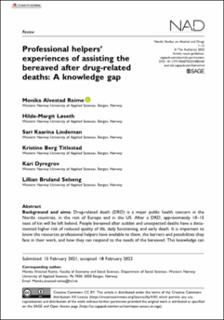Professional helpers’ experiences of assisting the bereaved after drug-related deaths: A knowledge gap
Reime, Monika Alvestad; Løseth, Hilde-Margit; Lindeman, Sari Kaarina; Titlestad, Kristine Berg; Dyregrov, Kari; Selseng, Lillian Bruland
Peer reviewed, Journal article
Published version

Åpne
Permanent lenke
https://hdl.handle.net/11250/3028076Utgivelsesdato
2022Metadata
Vis full innførselSamlinger
- Import fra CRIStin [3604]
- Institutt for velferd og deltaking [1018]
Originalversjon
Reime, M. A., Løseth, H.-M., Lindeman, S. K., Titlestad, K. B., Dyregrov, K., & Selseng, L. B. (2022). Professional helpers' experiences of assisting the bereaved after drug-related deaths: A knowledge gap. Nordic Studies on Alcohol and Drugs, 39(4), 453-465. 10.1177/14550725221085345Sammendrag
Background and aims: Drug-related death (DRD) is a major public health concern in the Nordic countries, in the rest of Europe and in the US. After a DRD, approximately 10–15 next of kin will be left behind. People bereaved after sudden and unexpected deaths have a documented higher risk of reduced quality of life, daily functioning, and early death. It is important to know the resources professional helpers have available to them, the barriers and possibilities they face in their work, and how they can respond to the needs of the bereaved. This knowledge can help prevent severe health and social consequences of bereavement following a DRD. In this systematic review, the aim was to explore knowledge regarding professional helpers’ experiences of providing assistance to people bereaved after a DRD. Methods: Inclusion criteria were empirical studies of professional helpers’ first-person perspectives on meeting the bereaved after a DRD. Quantitative, qualitative, and mixed-method studies were included. Results: The results show that there are no studies addressing professional helpers’ experiences of providing assistance to the bereaved after a DRD. Conclusion: There is a vital need to develop more knowledge of professional helpers’ perspectives. This knowledge is important not only to improve education and the quality of health and social services, but also to help raise awareness of the bereaved after a DRD.
